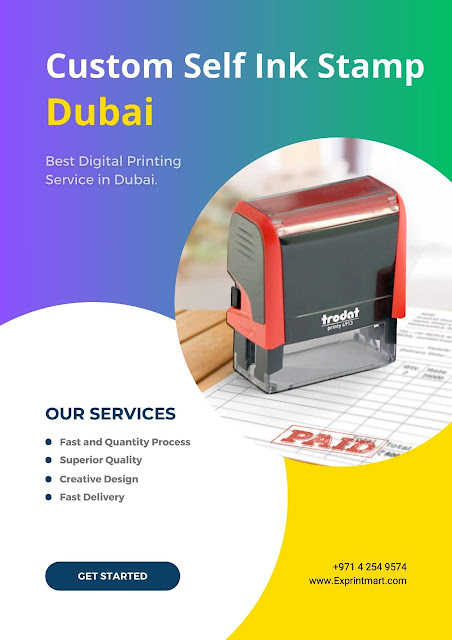How Do Self-Ink Stamps Stack Up Against Traditional Rubber Stamps?
How Do Self-Ink Stamps Stack Up Against Traditional Rubber
Stamps?
"Discover the stamping solution that fits your
style: from self-ink convenience to traditional rubber charm, find the perfect
match for your needs!"
When it comes to stamping, the debate between self-ink stamps and traditional rubber stamps is ongoing. Both have their merits, but which one comes out on top? Let's explore the differences and similarities between these two stamping options to help you decide which is best for your needs.
1. Understanding Traditional Rubber Stamps
Traditional rubber stamp in Dubai have been a staple in offices and businesses for decades. These stamps consist of a wooden or plastic handle attached to a rubber stamping die. To use a traditional rubber stamp, you typically need a separate ink pad. The stamp is pressed onto the ink pad before making an impression on paper.
2. Exploring Self-Ink Stamps
Self-ink stamps, also known as self-inking stamps, are a more modern alternative to traditional rubber stamps. These stamps contain an integrated ink pad that automatically re-inks the stamp after each impression. This eliminates the need for a separate ink pad and ensures consistent, clear impressions every time you stamp.
3. Convenience Factor
One of the biggest advantages of self-ink stamps is their convenience. With traditional rubber stamps, you have to keep track of a separate ink pad, which can get messy and be easily misplaced. Self-ink stamps simplify the stamping process by incorporating the ink pad directly into the stamp, making them ideal for busy professionals who need to stamp documents quickly and efficiently.
4. Consistency in Impressions
Consistency is key when it comes to stamping, and self-ink stamps excel in this area. Because the ink pad is integrated into the stamp, you can be sure that each impression will be consistently inked and clear. Traditional rubber stamps, on the other hand, may produce inconsistent impressions if the ink pad is not properly inked or if the pressure applied during stamping varies.
5. Durability and Longevity
When comparing durability, self-ink stamp often come out ahead. The integrated ink pad helps protect the stamping die from wear and tear, resulting in a longer lifespan for the stamp. Traditional rubber stamps may require more maintenance, such as re-inking the ink pad or replacing worn-out parts, to ensure consistent performance over time.
6. Customization Options
Both self-ink stamps and traditional rubber stamps offer
customization options, allowing you to create stamps with your desired text,
logo, or design. However, self ink stamp
online may offer more flexibility in terms of customization, as some
models allow you to easily change the ink pad or swap out the stamping die to
accommodate different designs or colors.
7. Environmental Considerations
In today's environmentally conscious world, sustainability is a factor to consider when choosing between self-ink stamps and traditional rubber stamps. While both options can be made from eco-friendly materials, self-ink stamps may be more environmentally friendly in the long run due to their longer lifespan and reduced need for replacement parts.
Conclusion
In the debate between self-ink stamps and traditional rubber stamps, there is no one-size-fits-all answer. Each option has its own advantages and disadvantages, and the best choice for you will depend on your specific needs and preferences. Whether you prioritize convenience, consistency, durability, or customization, both self-ink stamps and traditional rubber stamps can be effective tools for your stamping needs. Ultimately, the decision comes down to what works best for you and your workflow.




Comments
Post a Comment